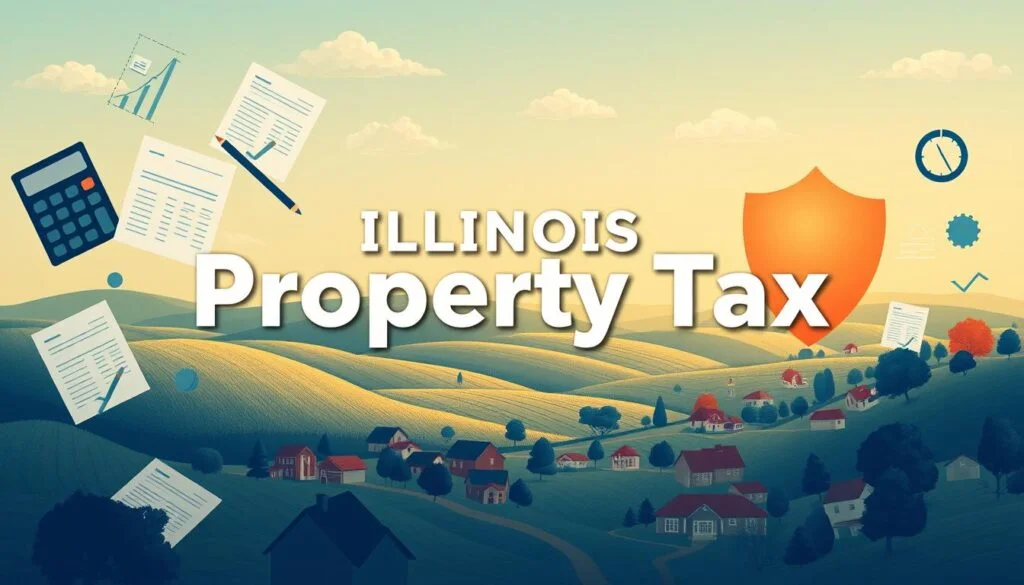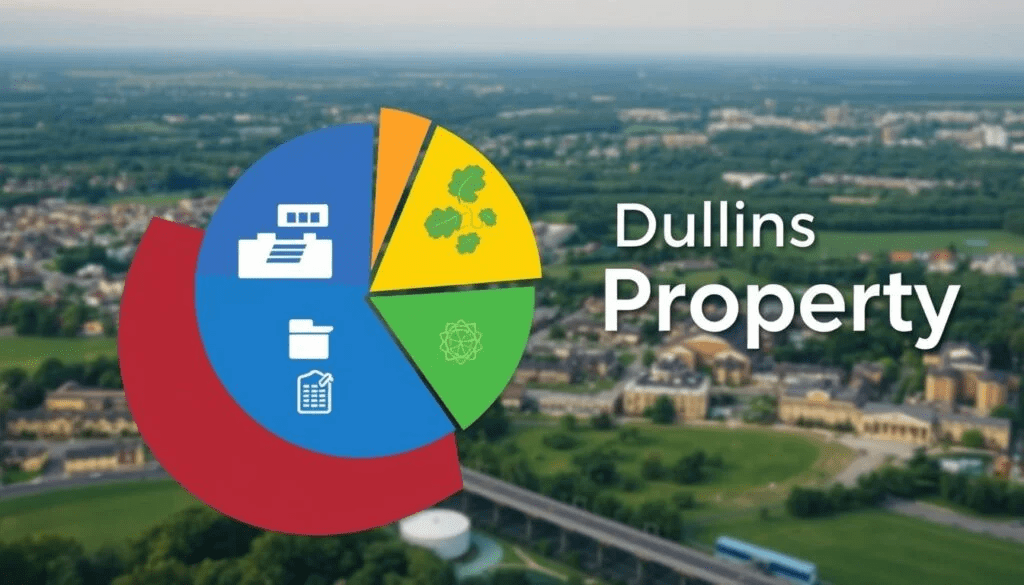Do you know How to Calculate Illinois Property Tax? With changing tax rates and complex assessment steps, figuring it out can be tough. But don’t worry, this guide will show you how to find out your Illinois property tax easily.
If you live in Chicago or DuPage County, knowing about illinois property tax assessment is key. This article will cover what affects your cook county property tax rates. It will also talk about illinois property tax exemptions and give a step-by-step guide to calculating property tax in Illinois. By the end, you’ll know how to handle your Chicago real estate taxes and dupage county property taxes.

Table of Contents
But first, a big question: Do you know the true cost of owning a home in Illinois? Learning about illinois homeowner tax credits and illinois tax cap legislation can really help lower your property tax. Let’s start and uncover the secrets to mastering your how to calculate property tax in illinois.
Understanding Illinois Property Tax Basics
Illinois property tax can seem complex, but knowing the basics is key. Understanding how your property is assessed and what affects tax rates is vital. This knowledge helps you figure out how much you’ll pay in taxes.
Property Tax Assessment Process
In Illinois, your home’s value is first evaluated by the local assessor. They look at your home’s size, age, and condition. They also consider recent sales of similar homes nearby. After determining your home’s value, they multiply it by the local tax rate to find your tax bill.
Factors Affecting Property Tax Rates
- Local government budgets and spending: The needs of your local schools, municipalities, and other entities affect your tax rate.
- Illinois property tax assessment: Your home’s assessed value plays a big role in your tax bill.
- Cook county property tax rates: Tax rates in Cook County might be different from other parts of Illinois.
- Chicago real estate taxes: Chicago, being the largest city, has its own tax structure and considerations.
Grasping these key points about Illinois property tax helps you make smart choices. It ensures you’re paying your fair share.
“Staying on top of your property tax obligations is crucial, as it can have a significant impact on your overall financial well-being.”

Determining Your Property’s Assessed Value
To figure out your illinois property tax, start with your property’s assessed value. This value is set by local assessors. It shows what they think your home is worth in the market.
The assessment process looks at a few important things:
- Location: Where your home is, like the neighborhood and schools, affects its value.
- Size and square footage: Bigger homes usually cost more to assess.
- Age and condition: Homes that are newer or in better shape get higher assessments.
- Recent sales of similar homes nearby.
To see what your home is assessed at, check your latest tax bill. Or, you can call your local assessor’s office. It’s smart to check this info often. Assessments change every one to three years.
| Property Characteristic | Impact on Assessed Value |
|---|---|
| Location | Higher values in desirable neighborhoods |
| Size | Larger homes have higher assessments |
| Age and Condition | Newer or well-maintained properties tend to have higher assessments |
| Recent Comparable Sales | Assessments are based on market data |
Knowing what affects your home’s assessed value helps you get ready for your illinois property tax. It also makes sure your assessment is right.
How to Calculate Illinois Property Tax
Figuring out your property tax in Illinois might seem hard. But, with the right info, it’s easier than you think. We’ll show you how to find out how much you owe in property taxes.
Step-by-Step Calculation Guide
To figure out your property tax in Illinois, just follow these steps:
- First, find out your property’s assessed value. This is what the local assessor thinks your home is worth. It’s usually a part of your home’s market value.
- Next, find out the tax rate for your area. Property taxes vary a lot in Illinois. They depend on where you live, like the county or city.
- Then, multiply your property’s assessed value by the tax rate. This will tell you how much you’ll pay in property taxes each year.
Example Calculation
Let’s say your home in Cook County, Illinois is worth $250,000. The tax rate there is 6.92%.
To find your property tax, just multiply the assessed value by the tax rate:
$250,000 x 6.92% = $17,300
In this example, you’d pay about $17,300 in property taxes each year.
Remember, your actual property tax might be different. This could be because of exemptions, assessments, or special taxing areas. Always check with your local assessor or a tax expert to make sure you’re right.
Illinois Property Tax Exemptions and Credits
If you own a home in Illinois, you might qualify for tax breaks. These can lower your property taxes. They help those who need it most, offering big savings.
Homeowner Exemptions
The Homestead Exemption is a common tax break in Illinois. It can cut your property’s value by up to $10,000. You must live in the house as your main home. Other exemptions are for veterans, people with disabilities, and new homeowners.
Senior Citizen Exemptions
- Senior Citizen Homestead Exemption: Reduces the EAV of a senior’s primary residence by up to $5,000.
- Senior Citizen Assessment Freeze Homestead Exemption: Freezes the EAV of a senior’s home, preventing it from increasing due to rising property values.
- Senior Citizen Tax Deferral Program: Allows eligible seniors to defer a portion of their property taxes, with the deferred amount becoming a lien on the property.
To get these illinois property tax exemptions, homeowners need to apply. They must provide the right documents and meet certain rules. These illinois homeowner tax credits can save you a lot of money each year.
| Exemption | Eligibility Criteria | Potential Savings |
|---|---|---|
| Homestead Exemption | Own and occupy the property as your primary residence | Up to $10,000 reduction in EAV |
| Senior Citizen Homestead Exemption | Age 65 or older, own and occupy the property as your primary residence | Up to $5,000 reduction in EAV |
| Senior Citizen Assessment Freeze Homestead Exemption | Age 65 or older, meet income requirements, own and occupy the property as your primary residence | Freezes the EAV of your home |
Knowing about illinois property tax exemptions and illinois homeowner tax credits can save you money. It’s a smart way to lower your property taxes and save a lot.
Cook County Property Tax Rates and Assessment
Cook County, the largest in Illinois, has a special way of handling property taxes. It’s important for homeowners and investors to know about cook county property tax rates and Chicago real estate taxes.
The Cook County Assessor’s Office figures out the value of properties. This value is used to calculate property taxes. They look at the property’s market value, where it is, and any special rules that might apply.
The Equalizer is a big part of Cook County’s tax system. It’s a number from the Illinois Department of Revenue that makes sure everyone pays the same. Changes in the Equalizer can affect your tax bill a lot, so it’s good to keep up with it.
| Tax Year | Equalizer |
|---|---|
| 2022 | 2.9160 |
| 2021 | 3.2234 |
| 2020 | 2.9786 |
Cook County’s tax system also has triennial assessment cycles. This means properties are reassessed every three years. This can cause big changes in your taxes, so it’s crucial to stay on top of it.
Understanding Cook County’s property tax system helps homeowners and investors plan better. Being informed and proactive is essential for dealing with Illinois property taxes.
DuPage County Property Tax Breakdown
Getting to know your property tax bill in DuPage County, Illinois, can seem tough. But, by looking at each part, homeowners can see where their money goes. We’ll look at the main parts of a DuPage County property tax bill.
Understanding Your Tax Bill
A DuPage County property tax bill has several parts. Each part affects how much you pay. These parts include:
- County Taxes
- Municipal Taxes
- School District Taxes
- Special District Taxes
- Other Taxes and Fees
The importance of each part can change based on where your property is in DuPage County. Let’s take a closer look at a sample tax bill from the area.
| Tax Category | Percentage of Total Bill |
|---|---|
| County Taxes | 15% |
| Municipal Taxes | 25% |
| School District Taxes | 45% |
| Special District Taxes | 10% |
| Other Taxes and Fees | 5% |
This table shows how dupage county property taxes are split among different taxes. Remember, the exact split can change for each property based on its location and other details.

Knowing what makes up your dupage county property taxes helps homeowners manage their taxes better. They might find ways to save or get exemptions. Next, we’ll explore how to appeal property tax assessments.
Appealing Your Property Tax Assessment
If you think your property’s value is off, you can appeal. Knowing why and how to appeal is key to handling your illinois property tax assessment.
Reasons to Appeal
There are several reasons to appeal your property tax:
- Errors in the property’s characteristics, such as square footage, number of bedrooms/bathrooms, or lot size
- Significant differences between your property’s assessed value and the market value
- Discrepancies in the assessment of your property compared to similar properties in the area
- Recent improvements or renovations that have not been properly accounted for
Appeal Process and Deadlines
The appeal process varies by county but generally includes these steps:
- Review your property’s assessment notice and gather any supporting documentation
- File an appeal with the appropriate county assessment office, usually within a specific deadline (e.g., 30 days from the date of the assessment notice)
- Attend a hearing or submit additional evidence to support your case
- Wait for a decision, which may result in a reduced assessed value, a confirmation of the original value, or a partial reduction
Remember the appeal deadlines are strict. Missing them can mean losing your chance to challenge the assessment. Make sure to check the specific requirements and timelines for your county to avoid missing deadlines.
“Appealing your property tax assessment can be a valuable way to ensure you’re not overpaying on your illinois property tax. By understanding the process and key reasons to appeal, you can take an active role in managing this important financial obligation.”
Illinois Tax Cap Legislation
The state of Illinois has a law to help homeowners with property taxes. It’s called the “Property Tax Extension Limitation Law” (PTELL). This law tries to stop property taxes from going up too fast.
Local governments like counties and school districts can’t raise taxes by more than 5% or the inflation rate. This means your tax bill might not go up as much as your property value does.
- The illinois tax cap legislation affects all taxing districts in the state, except for the City of Chicago and Cook County.
- The cap is based on the Consumer Price Index (CPI), which shows inflation. It decides how much taxes can go up.
- If you think your property value is wrong, you can appeal. This could lower your tax bill.
Even with the illinois tax cap legislation, some people are unhappy. Local governments say it makes it hard to fund important services. But the law is still in place. It’s important for property owners in Illinois to understand it.
“The tax cap legislation has helped to slow the growth of property taxes in Illinois, but it’s still a significant burden for many homeowners. Staying informed and exploring available exemptions and appeals can make a real difference in managing this expense.”
Strategies to Manage Property Tax Burden
Paying how to calculate property tax in illinois can be a big expense. But, there are ways to handle it better. Knowing what affects property taxes and acting early can help lower your taxes. This way, you can save more of your money.
One good strategy is to closely monitor your property’s assessed value. Assessments can change, and watching them closely can spot errors. If you think your property is overvalued, you might appeal to lower the assessment.
Also, take advantage of available exemptions and credits. Illinois has tax breaks like the Homestead and Senior Citizen Exemptions. These can save you a lot. Make sure you’re using all the exemptions you qualify for to cut down your how to calculate property tax in illinois.
| Exemption | Eligibility Criteria | Potential Savings |
|---|---|---|
| Homestead Exemption | Primary residence of the homeowner | Up to $10,000 reduction in assessed value |
| Senior Citizen Exemption | Homeowner aged 65 or older | Up to $8,000 reduction in assessed value |
Looking into alternative payment plans or deferment options can also help. Many places offer plans to pay in installments or delay payments. This can make managing your how to calculate property tax in illinois easier.
By using these strategies and keeping up with how to calculate property tax in illinois rules, you can reduce your tax burden. This way, you can save more of your money.
Conclusion
In this guide, we’ve covered the key steps to figure out your property taxes in Illinois. We’ve looked at how assessments work and how to use exemptions. You now know how to handle your property tax burden.
If you live in Cook County, DuPage County, or anywhere else in Illinois, this info is for you. It helps you understand the property tax system better. Knowing what affects your tax rates and using exemptions can save you money.
Being informed and active about your property taxes is crucial. It helps you keep your finances stable and get the most from your investment. By following this guide, you’ll be able to manage your property taxes in Illinois well. This will help you reach your financial goals.
FAQ
Q: What is the property tax assessment process in Illinois?
A: In Illinois, the assessor’s office checks your property’s value. This value helps figure out your property tax bill. They look at your home’s size, age, and condition, and compare it to similar homes sold nearby.
Q: What factors affect property tax rates in Illinois?
A: Several things can change your property tax rates in Illinois. This includes local tax rates and any exemptions you might get. Your property’s assessed value also plays a big role.
Q: How is a property’s assessed value determined in Illinois?
A: In Illinois, your property’s assessed value is 33.33% of its market value. The assessor’s office looks at your home’s details and recent sales of similar homes. This helps them figure out the market value and your assessed value.
Q: What is the step-by-step process for calculating property tax in Illinois?
A: To find your property tax in Illinois, start with your assessed value. Then, multiply it by the tax rates from your local taxing bodies. The formula is: Assessed Value x Tax Rate = Property Tax Bill.
Q: What are the most common property tax exemptions in Illinois?
A: Illinois offers several property tax exemptions. These include the Homestead Exemption, Senior Citizen Exemption, and more. These can lower your property tax bill.
Q: How are property taxes calculated in Cook County, Illinois?
A: Cook County has its own way of assessing property taxes. They use a system that assigns different rates based on property type. Homes are usually assessed at 10% of market value, while businesses might be assessed higher.
Q: What is the breakdown of a property tax bill in DuPage County, Illinois?
A: DuPage County property tax bills include charges from different taxing bodies. This includes the county, municipality, school district, and more. Your bill will show these charges and any exemptions or credits you might have.
Q: When and how can I appeal my property tax assessment in Illinois?
A: If you think your property’s assessed value is wrong, you can appeal. You’ll need to provide evidence to the local Board of Review. Check the deadline to appeal in your county, as it varies.
Q: How does Illinois’ tax cap legislation impact property taxes?
A: Illinois has a tax cap law, the Property Tax Extension Limitation Law (PTELL). It limits how much property taxes can go up each year. This law helps control tax growth, but taxes can still increase for homeowners.
Q: What strategies can I use to manage my property tax burden in Illinois?
A: To handle your property tax burden in Illinois, consider a few strategies. Claiming exemptions, appealing your assessment, and understanding tax cap laws can help. You can also look for ways to lower your home expenses, which can indirectly reduce your property taxes.
1 thought on “How to Calculate Illinois Property Tax: Easy and Simple Guide”